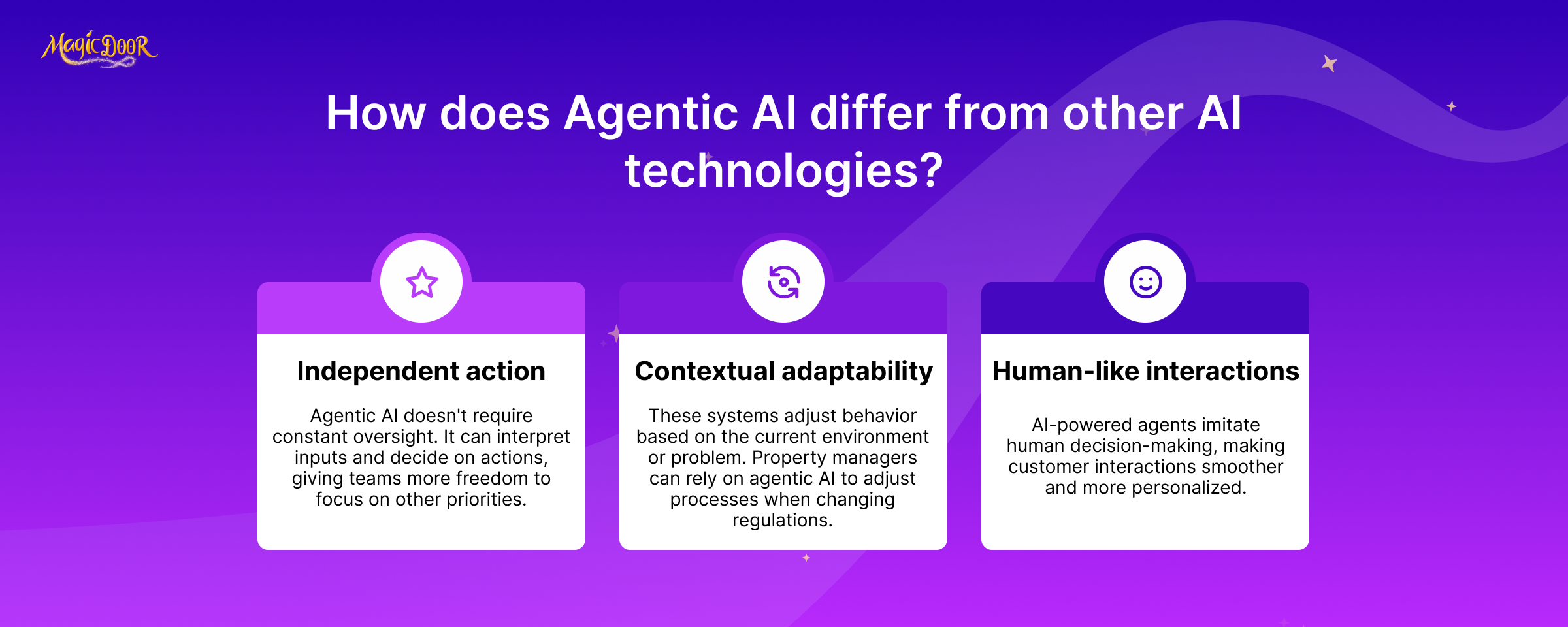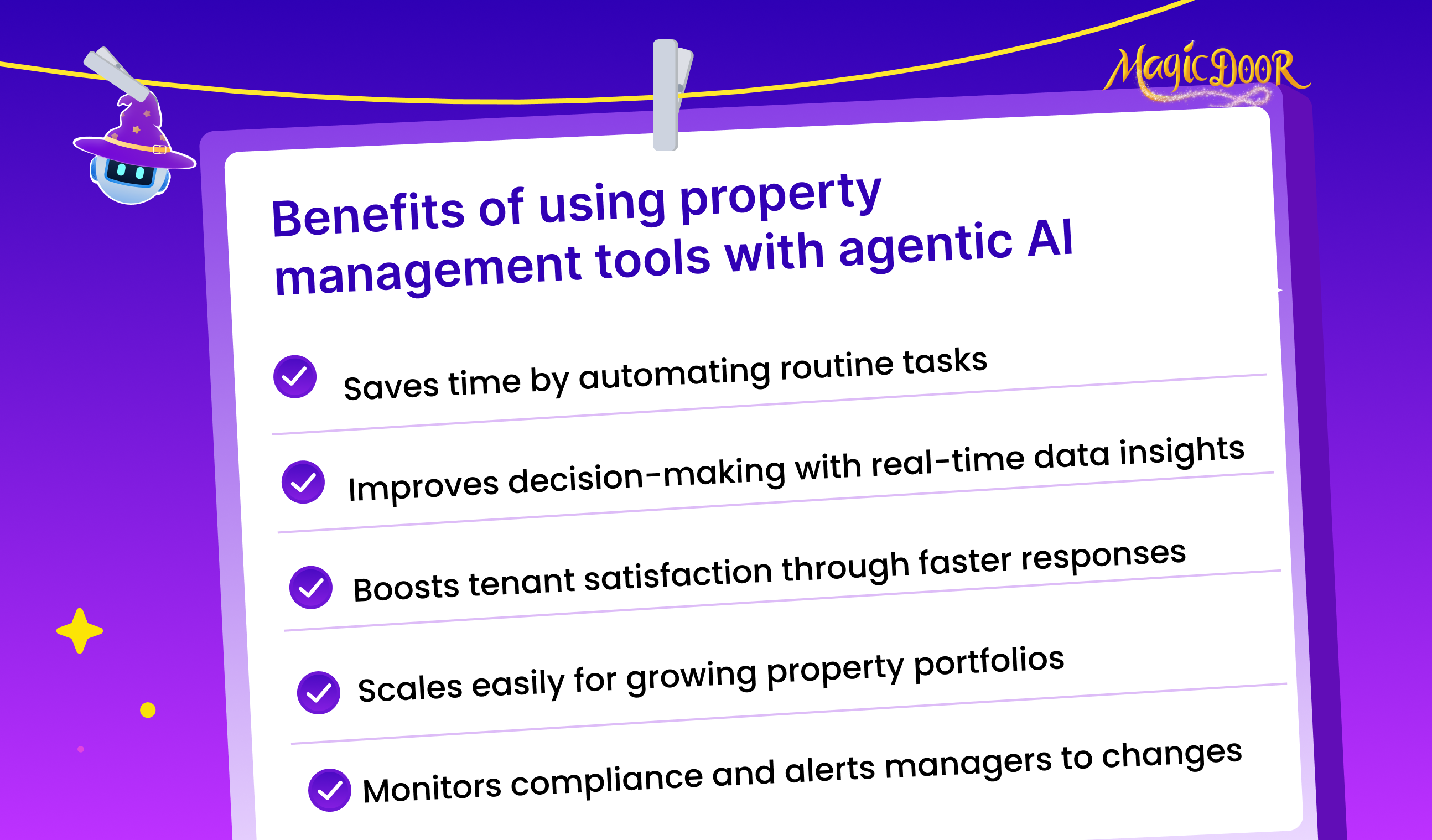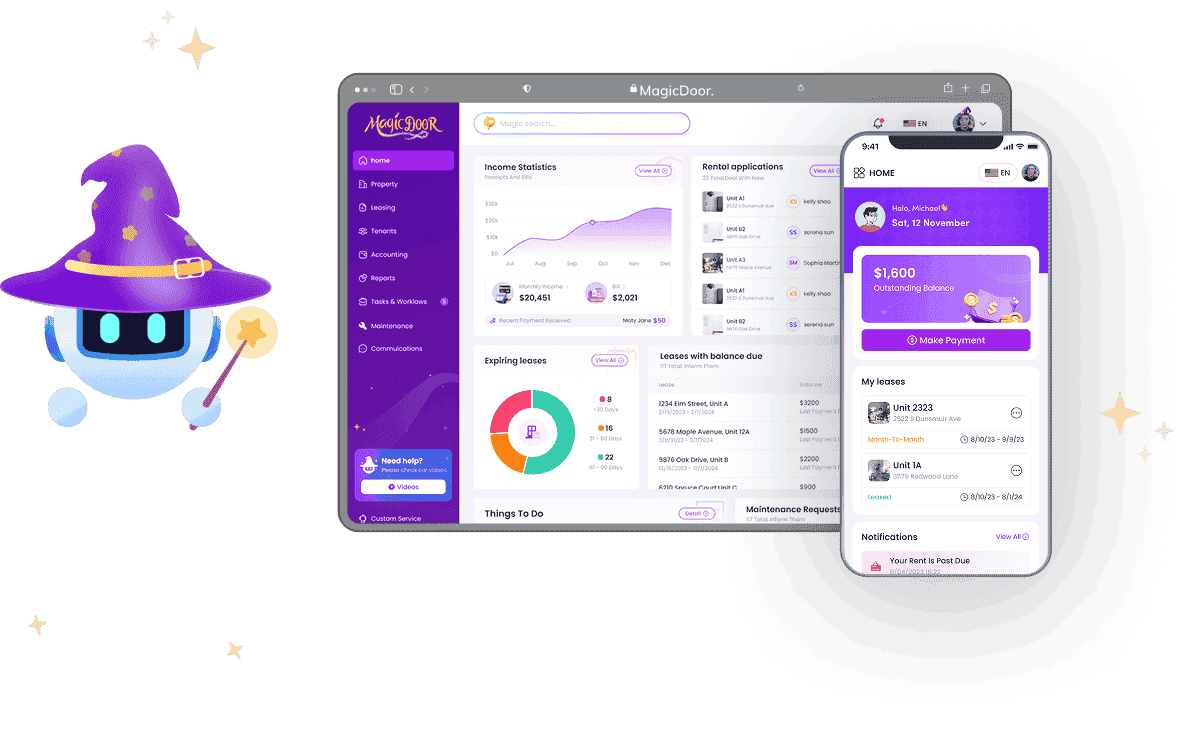Managing properties has its fair share of challenges.
The job demands focus and efficiency, from managing tenant requests to maintaining maintenance. But what if there was a way to simplify these tasks while boosting productivity?
Enter agentic AI, a groundbreaking development in artificial intelligence that’s changing property management from the ground up.
Agentic AI isn’t just about automation; it’s about smart automation. This form of AI operates independently, making decisions and solving problems based on real-time data, all with minimal human involvement.
A property management company advertises rental property and collects rental income on behalf of owners.
Throughout this blog, we’ll explore how agentic AI can change how properties are handled, from active tenant communication and better decision-making to efficient rent collection.
Read on!
What is Agentic AI?
Agentic AI is a form of artificial intelligence developed to operate autonomously, simulating decision-making capabilities like humans. Advancements in cloud computing have provided the necessary power and capacity to train and deploy complex agentic AI models.
Unlike traditional AI systems that primarily follow pre-programmed rules, agentic AI functions as an independent "agent" capable of analyzing various data sources and taking meaningful actions based on this analysis. Its adaptability makes it useful for problem-solving across different industries, including property management.
Advances in large language models (LLMs), which improve natural language understanding, are driving the growth of agentic AI.
For property managers, such systems can handle tasks like tenant communication, responding to maintenance requests, organizing rental payments, and even supporting compliance with regulations.
Some highlights of this AI technology include:
- Personalized customer interactions: Agentic AI helps property managers efficiently handle inquiries from clients and tenants, providing timely and relevant information.
- Intelligent decision-making: Using data-driven insights, these systems can recommend improvements or suggest resolution paths for issues involving tenants, repairs, or rental agreements.
- Automation of repetitive tasks: Routine responsibilities, like screening applicants or scheduling property maintenance, can move from human effort to AI-powered solutions.

This makes agentic AI particularly suited for residential property management businesses, where fast and responsible decision-making is highly valued.
As a capable partner for teams, agentic AI doesn’t only replace manual effort; it advances the way companies manage their assets, tenants, and daily processes. Whether for individual property owners or larger office associations, this technology ensures smoother workflows and greater flexibility.
How does Agentic AI differ from other AI technologies?

Agentic AI stands apart from other artificial intelligence systems due to its autonomous nature and decision-making abilities. It evaluates information from various sources, adapts to changing conditions, and takes the initiative to address specific challenges.
While conventional AI tools can be outstanding at processing data or performing repetitive tasks, agentic AI goes further.
It identifies opportunities, anticipates needs, and implements solutions with minimal human intervention. This difference enables property managers and owners to tackle responsibilities like tenant communications, maintenance scheduling, and compliance support more efficiently.
Differences include:
- Independent action: Agentic AI doesn't require constant oversight. It can interpret inputs and decide on actions, giving teams more freedom to focus on other priorities.
- Contextual adaptability: These systems adjust behavior based on the current environment or problem. Property managers can rely on agentic AI to adjust processes when changing regulations, tenant requirements, or other variables.
- Human-like interactions: AI-powered agents imitate human decision-making, making customer interactions smoother and more personalized.
Features of Agentic AI in Property Management
Automated Tenant Communication Tools
Automated tenant communication tools powered by agentic AI bring a new level of efficiency to property management. These tools simplify how property managers interact with tenants, creating a seamless flow of information that requires little manual intervention.
Using AI agents, PMs can handle multiple inquiries, send updates, and address concerns in real-time.
Some standout features include:
- Quick responses to tenant needs: AI-powered systems allow tenants to receive immediate answers to frequently asked questions, such as rent payment deadlines or maintenance schedules.
- Customizable messaging: These communication platforms allow personalized outreach. Property owners can send tailored messages regarding changes like lease renewals or local policy updates, ensuring tenants stay well-informed.
- Constant availability: Automated communication tools operate outside conventional office hours, making them accessible day or night.
AI-Driven Rent Collection

AI-driven rent collection simplifies a process that can often be time-consuming and predisposed to errors.
Integrating agentic AI into property management systems makes collecting rent more efficient, consistent, and secure. These tools leverage automation and data to ensure payments are processed smoothly, benefiting property managers and tenants.
Features of these systems include:
- Automated reminders: AI tools send timely payment reminders, reducing the risk of late payments and easing the burden on property managers to manually follow up.
- Secure payment processing: Advanced software solutions prioritize data security, ensuring transactions and sensitive financial information remain well-protected.
- Customizable payment options: Providing different payment methods, such as online portals or direct transfers, offers tenants flexibility and convenience while ensuring consistent rent collection.
- Real-time tracking: Property owners can monitor payments as they are processed, instantly receiving updates on completed transactions or outstanding balances.
Real-Time Maintenance Request Management
Managing maintenance requests can be one of the most time-sensitive tasks of property managers. Quick resolutions prevent minor issues from escalating into costly problems, ensuring tenants and property owners remain satisfied.
This is where Agentic AI steps in to simplify and accelerate the process. Using artificial intelligence's capabilities, property managers gain a powerful tool for handling maintenance needs.
Agentic AI monitors incoming requests, prioritizing them based on urgency and complexity. This intelligent sorting saves time and ensures critical issues receive immediate attention. Updates remain synchronized through seamless integration with existing property management systems, keeping everyone in the loop without manual follow-ups.
Benefits of real-time maintenance request management with Agentic AI include:
- Instant issue tracking: Maintenance requests are logged as soon as they're submitted, eliminating delays caused by manual data entry.
- Automated task delegation: The AI assigns tasks directly to the appropriate service providers or team members, allowing problems to be addressed faster.
- Proactive communication: Tenants and property managers receive real-time updates on progress, reducing inquiries.
Another advantage is the ability to analyze patterns in recurring issues.
For instance, the AI can evaluate data from vast requests to identify recurring malfunctions or high-risk areas. Property managers can use this insight to plan preventive measures.
Advanced Tenant Screening & Scoring

Effective tenant screening and scoring can define the success of property management operations. Agentic AI has made remarkable advancements in this process, benefiting property managers and landlords substantially.
One of the standout features of agentic AI is its ability to analyze vast amounts of information in seconds. Credit histories, employment records, income stability, and prior rental behavior can all be evaluated to generate detailed scoring metrics.
Agentic AI also integrates regional regulations and legal compliance into its processes.
With increasingly complex laws governing housing and rental interactions, compliance is crucial. This technology helps property managers align their tenant screenings with current rules, avoiding potential disputes from errors.
Benefits of advanced tenant screening with AI agentic include:
- Consistency and fairness in scoring, as the system applies objective criteria without bias.
- Reduction of human error by automating evaluations based on verified data.
- Faster turnaround times in processing applications, leading to quicker leasing decisions.
- Improved risk management by flagging potential concerns that could impact rental agreements.
Integrated Financial & Accounting Solutions

Property managers can handle complex accounting tasks with AI-powered tools with greater confidence and efficiency.
Agentic AI can automatically process invoices, track expenses, and sort large datasets. This technology ensures every transaction is recorded accurately, reducing the risk of errors.
Another valuable feature is the ability to generate financial reports effortlessly. Managers can analyze cash flow, estimate income from rental operations, and create customized summaries tailored to specific property requirements.
Tax season, often stressful for anyone involved in property management, becomes much more manageable with Agentic AI. The system identifies tax implications, organizes relevant documentation, and highlights potential deductions.
Financial benefits of integrating Agentic AI into property management include:
- Improved cash flow tracking across multiple rental and commercial properties
- Automated expense categorization to maintain organized financial records
- Customized reporting tools for better financial visibility and control
- Simplified tax preparation, ensuring all obligations are met on time
Multilingual Message Translation Capabilities

Managing communication in diverse communities can be challenging, especially in environments where tenants, landlords, or service providers might speak different languages.
Agentic AI offers a practical solution by incorporating multilingual message translation features, ensuring that property managers can effectively reach all parties, no matter their preferred language.
Property managers handling residential and commercial properties must communicate clearly and accurately. Multilingual translation capabilities simplify this process by allowing smooth interactions in various languages without external support.
Whether discussing lease agreements or troubleshooting maintenance concerns, this feature clarifies every interaction.
Here’s how multilingual translation benefits property management:
- Improved communication: This feature significantly reduces misunderstandings caused by language barriers. All parties receive information in their chosen language.
- Time-saving: No need to outsource translation or spend hours working around language issues. Managers can focus on more critical duties while maintaining clear dialogue.
- Inclusive operations: Property teams can engage tenants from diverse backgrounds, making every resident feel valued.
Why Should Property Managers Use Property Management Tools With Agentic AI Systems?
Property management can be a demanding field, often requiring the ability to juggle multiple responsibilities simultaneously.
From handling tenant inquiries to maintaining maintenance schedules, efficiency, and organization are constantly needed. That’s where property management tools integrated with agentic AI systems can make a substantial difference.

With its advanced capabilities, agentic AI handles repetitive tasks, allowing property managers to focus on higher-priority aspects of their work.
Automated systems powered by AI agents improve communication, simplify scheduling, and analyze vast amounts of data to provide actionable insights.
Here’s a closer look at why these tools change how professionals manage properties.
- Time-saving automation: Routine administrative work can be easily managed by responding to standard tenant queries or setting up appointments.
- Data-driven decision-making: With access to real-time information from various data sources, AI tools can offer suggestions that align with regulatory requirements and market trends. For example, when informed by reliable insights, lease renewal strategies or pricing adjustments become more accurate.
- Enhanced tenant satisfaction: Quick responses to tenant requests and predictive maintenance systems ensure properties operate smoothly. Residents appreciate timely solutions to their concerns, contributing to higher satisfaction levels.
- Scalability for businesses: Whether managing a few residential units or a growing portfolio of commercial spaces, agentic AI scales according to your business's needs.
- Improved compliance monitoring: Keeping up with evolving regulations can be a challenge. AI systems help monitor new rules and offer alerts when updates impact property operations.
MagicDoor is The Only Property Management Software With Agentic AI
Managing properties often involves balancing tenant needs, legal requirements, and operational tasks.
MagicDoor, however, takes property management a step further by integrating agentic AI into its system. This AI-native software provides tools that simplify daily responsibilities and introduce smarter solutions for recurring challenges.
MagicDoor uniquely combines the ability to communicate, analyze, and automate tasks smoothly within one platform. It uses AI-driven automation to ease the limitation of time-consuming duties.
For instance:
- Maintenance support: Tenants can report issues via text, where MagicDoor's AI assesses and either resolves problems or connects the request with the right vendor.
- Better communication: Through a centralized hub, the tool ensures that all parties, including tenants, landlords, and vendors, are informed.
- Applicant screening: This AI software uses advanced evaluation methods to assign scores reflecting applicant suitability.
Founded by an AI expert with property management experience, the platform reflects real-world challenges property owners encounter. Every feature feels intentional, from creating rental listings to tracking lease updates, ensuring smoother workflows at every stage.
Conclusion
Agentic AI modernizes property management by automating tasks, enhancing decision-making, and improving tenant relationships.
Integrating agentic AI offers a practical solution that aligns with those goals for property managers facing challenges like meeting tenant needs, maintaining compliance, or scaling portfolios effectively.
Are you ready to see how agentic AI can change your property management strategy?
Explore how MagicDoor, designed with AI-native technology, makes efficiency and improving property operations a reality. Get a demo today!

